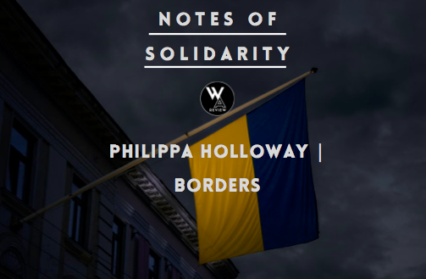Notes of Solidarity is a new daily series of mini-essays, poems, and reflections on the Russian war on Ukraine by some of Wales’s leading literary figures. Here, novelist Philippa Holloway, whose debut work, Half-life of Snails, draws upon her psychogeographic research in the Chernobyl Exclusion Zone, examines her experiences between Ukraine and Ynys Mon.
I’m waiting at the border between safety and danger, at a checkpoint on the edge of the Chernobyl Exclusion Zone – a landscape that has terrified me since footage of that ravaged reactor appeared on TV and mum closed all the windows for a fortnight. Men in army fatigues squint at me and my documents. Blossom from the trees inside the Zone, the contaminated Zone, drifts over the fence. The birds flit from inside to outside. The dosimeter purrs. Later it screams. Later it’s silent. Radiation knows no borders. The fences are arbitrary. My body tells me this. I listen.
I’m driving over the border, from England to Wales, back home. I wasn’t born here, but I became me here, and when I left, I felt myself tear. My ribs ache, my chest full, a tidal surge of knowing I belong here even though I don’t. My mouth still shapes Welsh words – part of me, my feet still fit the contours of the land – part of me, my tongue still tastes the air – part of me. I’m home, not home. I’m Welsh, I’m not Welsh. I’m Welsh. My body tells me this. I listen.
I’m standing on my doorstep, the border between warm and rain, when I hear the report on the news. I stop. Tanks, shelling, sirens… on streets I walked with those same citizens just a few years ago, safe. Leaves blow in past my feet, rain spatters the hallway, light spills from behind me onto wet paving slabs. I stand on the cusp of out and in and think of borders, of language, of Welsh and Russian and English and Ukrainian words that elide within a single sentence and don’t define us as binary but quite the opposite, show us to be composite. I think hiraeth, toska, homesick, tuha za domom and they all feel the same. My body tells me this. I listen.
I’m writing, on the border between real and imaginary, building fiction on the solid foundation of facts to find truth somewhere in the architecture of words and language, fabula and syuzhet. My characters ask: ‘What was the fight about? Why did they attack you?’ and reply: ‘Territory. Why else?’ They stand on riverbanks, cross checkpoints, wear dosimeters to work in an office and to traverse the Exclusion Zone, fight new developments and old disasters, are displaced and return and refuse to leave and a woman, one of the Samosely, says ‘to leave is to die’. Her body tells her this. And she listens.
I’m online, on the border between embodied and digital and the screen is a threshold. I click between live news and messaging friends who may or may not be there, who may or may not be safe. There are people at the borders – of homes and cities and villages and train stations and refuge – at the borders of themselves. I have no claim to the fear and displacement that sits like a rock in my chest, they are not mine. But how can we not feel it? Our bodies tell us this. We need to listen. A whisper, a murmur, a call, a shout, a roar: hiraeth, toska, homesick, tuha za domom…
Philippa Holloway
Philippa Holloway is an author, academic and psychogeographer whose PhD research examining nuclear psychogeography involved research in Ukraine and Chornobyl’s Exclusion Zone as well as Ynys Mon. Her debut novel, the Half-life of Snails, drawn from this research, is set in North Wales and Ukraine during the 2014 Euro Maidan Revolution (the ‘Revolution of Dignity’).
For more information on the Russia-Ukraine war, including ways you can help, please click here.
You can follow all contributions to Notes of Solidarity from Wales Arts Review here.
Reading recommendation: Alex Lockwood’s novel The Chernobyl Privileges poignantly explores the trauma of displacement due to nuclear disaster. Svetlana’s Alexiavich’s Chernobyl Prayer (Voices from Chernobyl) gives voice to the displaced. Lastly, Becky Alexis-Martin’s Disarming Doomsday (non-fiction), which uses nuclear geography to explore the history of nuclear war and the human cost of the nuclear age.











